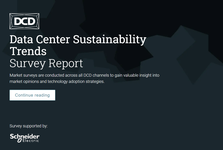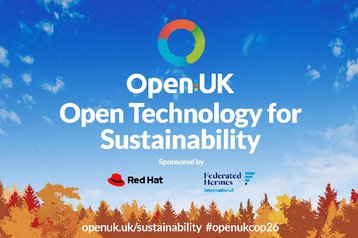UK open source pressure group OpenUK has shared a net zero data center blueprint at a COP26 event in Glasgow highlighting the role of open technologies in reducing emissions.
The so-called "Patchwork Kilt" framework is aimed at making new Edge data centers sustainable, by reusing derelict buildings and joining local circular economies. It is being announced at an Open Technology for Sustainability Day at Skypark Glasgow, within the security cordon of the UN's COP26 climate conference. The day is sponsored by Red Hat and speakers include former minister for trade and investment Francis Maude (Lord Maude).
Faster collaboration
"Today, we must deliver for our entire world population and Open Technology has a great opportunity to lead in this work. Building on the values of collaboration and community, we have to work together to design and build the systems that will support us all in becoming more energy efficient, more sustainable, and more flexible,” said the Rt Hon Francis Maude, Lord Maude of Horsham.
"The key opportunity for Open Technology today is to show how much faster it can help everyone participate and contribute and to expand the number of organizations able to work in collaboration and co-opetition to make their systems more energy efficient."
The net zero blueprint, based around Edge computing and 5G, addresses the issue of how small urban facilities close to end users can be made sustainable without the economies of scale brought by centralized cloud operations. It proposes measures such as the use of derelict building stock, adopting open source hardware and software. The proposal aims to re-use, recycle and repurpose as much as possible, and make the data centers part of the communities they support, connected to heat sharing systems and other circular economy measures.
The blueprint will be handed to the Eclipse Foundation, an open source group originally created to manage the ex-IBM Eclipse software development environment. Eclipse will host the project and support its development and expansion. Contributors so far include OpenUK, the Open Compute Project, the Sustainable Digital Infrastructure Alliance (SDIA), ITRenew, the Scottish 5G center and the Octopus Energy center for Net Zero.
“Projects like this one can demonstrate a lasting impact on energy efficient computing and data center design, based on making the most of circular economy design and open source hardware and software together. We think this is the first time this approach has been taken, and we are pleased that the Eclipse Foundation will support getting more users to take advantage of this work. We’re also pleased that the name - Patchwork Kilt - will be a reminder of the COP26 conference and the role that this conference will play in how companies and communities respond to the climate crisis,” said Amanda Brock, CEO at OpenUK.
John Laban, European director at the Open Compute Project Foundation, added: “The largest machine ever made by homo sapiens is the Internet and the most complex puzzle ever solved by homo sapiens is probably mapping the human genome and both of these were achieved by forming worldwide open collaborative commons. The millions of open source technology hackers/makers working today can contribute hugely to the actions required to solve the climate emergency so why not use them and learn from them the art of complex systems collaboration to solve the climate emergency problem fast."
Other panel sessions in the open day will address the energy sector, and supply chain transparency, with speakers including Creative Commons CEO Catherine Stihler, UN Director Salem Avan and Open Invention Network CEO, Keith Bergelt; as well as Gavin Starks, CEO of Icebreaker One.
“The true nature of open source culture is aligned with the ideals of the United Nations, its mandates and values, which are founded on openness, transparency, inclusivity, equality and multilateralism or constructive collaboration. The open source approach can represent lower barriers to entry allowing future generations of technologists from every part of the world to work with unity of purpose and shared values to build strong and sustainable solutions,” said Salem Avan, Director, Policy, Strategy and Governance at The United Nations
More in Sustainability
-

-

-

Episode Why Sweden, why now?

